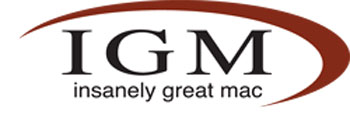Greenpeace changes the 'rules'
June 25th 2008
Greenpeace has published the latest edition of their Guide to Greener Electronics. In its critique of Apple, the group summarized thusly:
Increasing number of products free of the worst toxic chemicals. Low scores on energy except for good energy efficiency in products.
The mothership's overall rating, despite largely chemical-free and highly energy-efficient products, actually saw the company fall from 10th to 11th place on the Greenpeace's list. This is due to the addition of climate-related criteria, as well as new "banned" chemicals.
As was the case with Climate Counts, another environmental group with a penchant for buzz, Apple is rated poorly by Greenpeace not because of anything the company's actually done to harm the environment, but because Cupertino didn't play ball.
For example, on the "Support for global mandatory reduction of GHG emissions" criteria point, Apple was judged to be "bad" because it provided "No information." Likewise, on five out of six new climate related reporting criteria, Apple is rated "bad" because it didn't provide the documentation Greenpeace wanted to see.
It does only slightly better on energy criteria, failing to score on all criteria except energy efficiency of products, where it scores top marks (doubled) for all desktop computers, portable PCs and displays complying with Energy Star 4.0 and their iPod and iPhone power adapters not only exceeding the Energy Star standard, but already meeting California's stricter efficiency regulations that take effect 1 July 2008.
So, Apple's a "bad" company, an abuser of the environment, because it didn't provide proof (whatever that means) that it's not an abuser of the environment?
For example, will parents be labelled as abusers because they haven't provided proof that they're not abusers?
That voodoo that they do
You really need to read Greenpeace's Greenpeace - New Improved Ranking criteria explained document for yourself. It is chock full of questionable science and extremely subjective criteria.
Does anyone else think this is a "bad" way to pursue change? In places where the rule of law holds, isn't the role of the accuser to have proof of an abuse / crime before making an accusation?
Company's do need to be held accountable for what they do. So do environmental groups...
What's your take?
